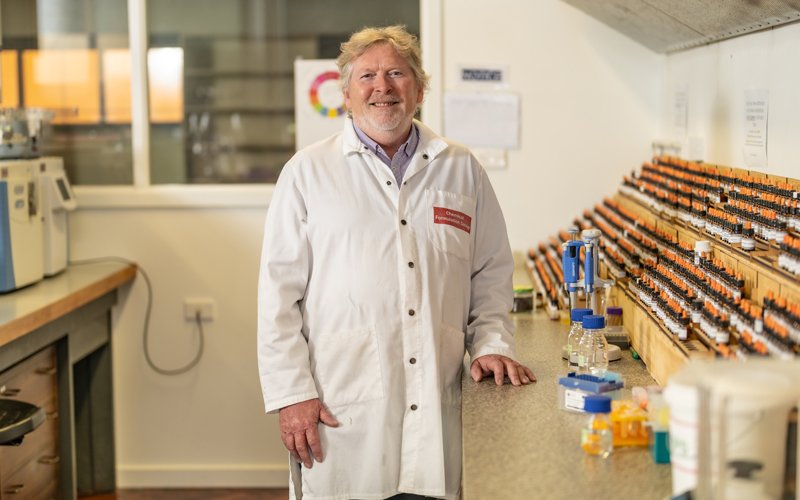6 May 2024
Professor, perfumer, pianist – these are just a few of the professions and pursuits this chemical engineer has explored.
With an affinity for science and the arts, the founder and head of the School of Product Design at the University of Canterbury has established unique, multidisciplinary degrees equipping graduates with knowledge and skills in science, engineering, business and marketing.
Professor Conan Fee FEngNZ first practised his aptitude for merging disciplines when he crafted his own engineering degree in the 1980s.
“While I began a civil engineering degree, I soon discovered it wasn’t for me,” he says. “But I started reading books on the biochemistry of the brain and became very interested in the idea of chemical engineering being applied to biomedicine.”
Switching his studies to chemical engineering, Conan selected electives in biological science, such as molecular biology and biochemistry.
“It was my way of creating a biochemical engineering degree, which didn’t exist at the time.”

Photo: Momac
A PhD exploring the link between blood turbulence and atherosclerosis was followed by industrial research into protein purification. He then took a postdoctoral fellowship in Canada and since then, his career has included sabbaticals in the United States, Sweden, the United Kingdom and Australia.
“I moved back to New Zealand to take up a position at the University of Waikato, co-developing a technology degree which ultimately became the engineering school.”
I wanted to create a degree that would produce graduates who are not only good technically, but also had user-focused design skills and an interest in entrepreneurship.
An opportunity to take up a Chair at the Department of Chemical Engineering at the University of Canterbury meant a move south to his hometown in 2005. There, Conan also co-founded the Biomolecular Interaction Centre, which researches molecular interactions critical to biological function and new disease treatments.
“Then post-earthquake, I became Academic Dean of Engineering, and the University was charged with the challenge of doubling the number of engineering students, which I anticipated to be difficult.”
Conan established two new degrees to attract students to the fractured city.
“One was the Diploma of Global Humanitarian Engineering, which stemmed from my realisation that engineers had a bad rep for going into disaster relief or helping developing countries with a technical solution that was ultimately ineffective because they hadn’t considered the location’s culture. This diploma would require our engineering students to do some humanities subjects to get that understanding.”
The other degree, the Bachelor of Product Design, was sparked by his view that New Zealand’s industry was too conservative and lacking in aspiration.
“I realised that we needed a lot more entrepreneurial success, more companies that are globally competitive. We’d been teaching engineering for 130 years and I didn’t think it was quite the right discipline to make that happen. We needed a different mindset.
“I wanted to create a degree that would produce graduates who are not only good technically, but also had user-focused design skills and an interest in entrepreneurship.”
He says while most design schools are independent or affiliated with the arts, “… all of our students study maths and basic quantitative engineering and fundamental sciences, so they get a better understanding of the solutions they’re making”. Additionally, business courses help them make a market-viable product.
Conan says shortages in different engineering disciplines seem to come in sinusoidal waves and are a global phenomenon.
“At the moment, the flavour of the month in Canterbury is mechanical and mechatronics engineering, while three or four years ago, it was civil engineering. But now the industry is starving for those graduates.”
Chemical engineering has a big role to play in sustainability and combatting climate change, but the discipline also needs to attract more students.
“It’s a broader degree than most people realise. Chemical engineers have a huge influence on the entire life cycle of a product, from the raw materials to where it finishes at the end of life. And of course, the production of alternative fuels using renewables is all part of the chemical engineering toolkit.”
Prior to the pandemic, Conan and his wife were set to go to France to learn more about perfumery, but the world shutting down put a stop to that idea.
“I’m always telling my students to start up a business and I’d developed some expertise with perfumes, so I decided to start a perfumery. When we put it together, my chemical engineering came into play because I recognised a very straightforward way people could design their own perfumes.”
Fragranzi is now a thriving business located in The Arts Centre in Christchurch, with 3,000 people making perfumes in 2023.
In addition to his mind for science and his nose for scent, Conan has an ear for music. He began learning the piano at the age of four. Throughout his youth he also learned the violin and played in chamber music groups and orchestras.
His piano studies culminated in a Licentiate in piano performance from the Royal Schools of Music in 1981.
“As a teenager, I competed in national piano concerto competitions and my vision was to become a concert pianist.
“While my musical interpretation was good, I think my technical ability never got to the flawless standard that you need, and I was drawn to the sciences.”
Judging from his research successes and the impact he’s had on tertiary education, the engineering profession has significantly benefitted from this direction change.
This article was first published in the March 2024 issue of EG magazine.




